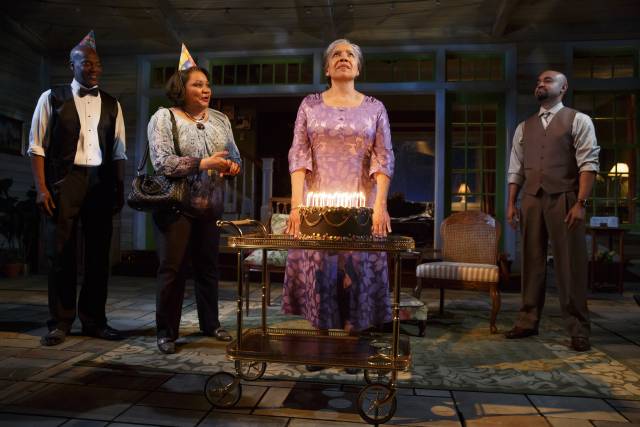
 Head of Passes opens in a very familiar manner, as we see people in the home of Shelah (Phylicia Rashad) bustling in anticipation of a celebration set to take place that night. Shelah’s children have decided to throw her the big birthday bash she has spent her entire life denying herself, for she was always a woman devoted to helping others, rather than herself. A devout Christian, obedient to her god, so “blameless and upright” she even squirms at the notion of “deviled eggs” because they have the name of Satan. Her home is located in the Head of Passes, where the capricious waters of the Mississippi River split into three different directions, perhaps one of each meant to represent Shelah’s three children.
Head of Passes opens in a very familiar manner, as we see people in the home of Shelah (Phylicia Rashad) bustling in anticipation of a celebration set to take place that night. Shelah’s children have decided to throw her the big birthday bash she has spent her entire life denying herself, for she was always a woman devoted to helping others, rather than herself. A devout Christian, obedient to her god, so “blameless and upright” she even squirms at the notion of “deviled eggs” because they have the name of Satan. Her home is located in the Head of Passes, where the capricious waters of the Mississippi River split into three different directions, perhaps one of each meant to represent Shelah’s three children.
Aubrey (Francois Battiste) is the righteous one, whose love for his mother is perhaps only overshadowed by his sense of self-righteousness, Spencer (J. Bernard Calloway) is the forgetful child who seems to have a problem remembering his duties, and Cookie (Alana Arenas) - who isn’t even Shelah’s biological daughter - is the trouble child, who has thrown away her life seduced by drugs and destructive men. All Shelah truly wants is for her children to be happy, and as we see her servants (Kyle Beltran and John Earl Jelks), and friend Mae (a scene stealing Arnetia Walker), in nonstop activity, Shelah takes the time to plead with god and ask that she looks after those she loves when she’s gone.
Like a matriarch out of a Tennessee Williams’ play, Shelah holds secrets perhaps too large for the stage to contain, and then when a natural disaster strikes, not only do they become buried even deeper within her, but playwright Tarell Alvin McCraney, presents us with yet another set of problems, to make us ponder on the importance we assign to petty issues in the face of larger disasters. We also see Shelah move away from Grand Southern Dame territory and descend into positively Lear-esque territory. Rashad takes over the stage with such subtle power, that it might even take a while before we become aware of the beauty of her technique, things as “small” as the sound of a cough, or a hand gesture to express heartbreak, make Shelah a human being that exists beyond the confines of a play. It’s an act of theatrical bravura that redefines the concept of “force of nature”.
Directed with by Tina Landau, and featuring astonishing scenic design by G.W. Mercier, Head of Passes, haunts because of how it subverts tropes we thought we knew well. When at the beginning of the play, a lightbulb goes off to highlight a dramatic point, we assume McCraney is taking the concept of “deus ex machina” to facile levels, but soon we understand that the playwright is trying to convey a larger power in play indeed. A power that can be attributed to god, since the play is constantly riffing on the Book of Job, but also a sense of powerlessness experienced by non-believers forsaken by governmental institutions in the face of catastrophe. From a deceivingly simple premise, Head of Passes builds its way into a complex defiance of our notion of structure, whether spiritual or laical, that felt right at home in the Public Theatre, where the roar of the subway passing underneath, felt both like a planned sound effect, and a nudge from an otherworldly power.